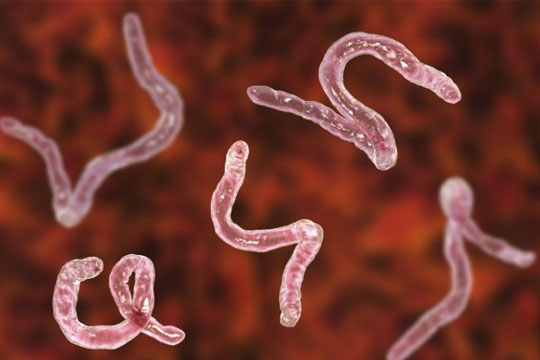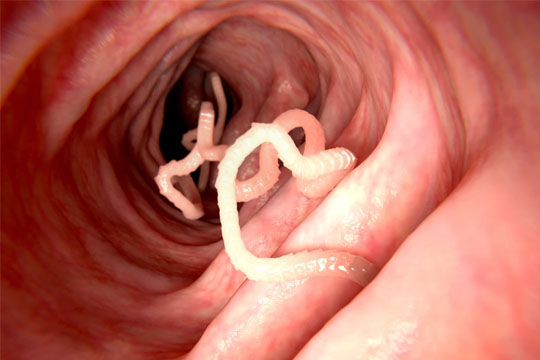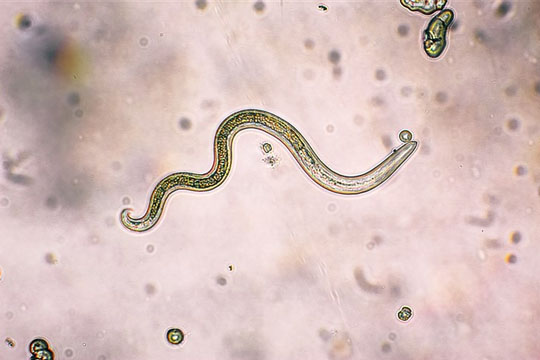Dog owners everywhere know this truism; the dog is man’s best friend. They teach us about responsibility and concern for others. They provide company and comfort. They are loyal and protective. And most importantly, they grace our lives with unconditional love. So naturally, we want our dogs to live their best life, and this includes keeping them healthy and vibrant. Unfortunately, dreaded parasites and worms can seriously threaten a dog’s health and even its life. So, what can you do to protect your canine friend from this threat? First, you need to know about the common types of parasites dogs are susceptible to and how to detect them.
A parasite, by definition, survives solely by feeding off a host, in this case, your beloved pet. Some hitchhike onto their skin, including fleas, ticks, lice, and mites. Others develop and live predominantly in the gut, such as hookworms, ringworms, roundworms, tapeworms, whipworms, coccidia, giardia, and spirochetes. The deadliest of parasites gets its name from the vulnerable organ it inhabits, the heartworm.
External parasites are visible to the naked eye, although you need to know what you are looking at. Fleas are tiny, fast-moving brown dots you can see scurrying around your dog’s hair or fur. They cause severe itching which can result in irritated bald patches, mainly down the back. Fleas also are carriers of a certain type of tapeworm, so it is important to treat your dog for worms in addition to flea treatment. Other pets in the home, as well as the home environment itself, should also be treated. Likewise, for lice, which present as tiny white eggs or nits found on your dog’s hair shaft. Ticks feed off your pet’s skin and blood if allowed to attach. An attached tick becomes large and swollen with blood. Mites feed off the waxes and oils in your dog’s ears and look like black dust or dirt, or they can feed off their skin and look like small white flakes in your dog’s coat. You will also see small red bumps if your dog is being bitten by mites. All these external parasites cause extreme discomfort to your dog and can lead to more serious infections or other conditions if left untreated.
The rest of the parasite family, and the nastiest, live internally. All except heartworm reside in the intestine. Signs that your dog may have an internal parasite include scooting, vomiting, diarrhea, weight loss, swollen abdomen, and, in some cases, coughing. They can also cause poor growth and development. You may see them in your dog’s stool, but you may not. It is important to recognize the signs and treat your dog before complications occur.
Of course, prevention is the first, best step in maintaining optimal Pet Health. Unfortunately, however, there is a good chance your dog will contract some form of the parasite, whether external or internal, over the course of its life. There are many remedies and products that claim to provide effective prevention and treatment, but which one is right for your dog? While there is no replacement prescription worm treatment, dog owners can do a lot to prevent a costly trip to the vet, as well as exposing their pet to potentially harmful chemicals and their side effects. Nature offers an abundance of options that, when used alone or combined, can keep your dog healthy and parasite free.
One of the great joys in life is bringing a new puppy into your home. They quickly become an integral part of your family, so it’s no wonder you want to do all you can to help your new fur baby get a healthy start in life. Of course, a visit to the vet is your first step towards that goal. Among other health concerns to consider, deworming is a priority for your new puppy. Unfortunately, worms are a common fact of a young pup’s life. In this article, we will explore why puppies are susceptible to worms, the different types of worms they may be exposed to and how these nasty parasites are transmitted, and the signs your puppy has worms and how best to treat and protect them.
Like all new babies, puppies are born with an immature immune system. In fact, a puppy’s immune system is not fully developed until 14 months. Of course, a puppy is born with its mother’s antibodies, but this protection only lasts from three to twelve weeks. Therefore, it is essential for your puppy’s healthy growth and development to protect its system from invaders and subsequent infections or worse. The sad fact is most puppies are born with worms. Here is a list of those nasty internal parasites and how they can attack your puppy, as well as any signs to look for to know if your puppy is affected.
- Roundworms are the most common worm found in a puppy’s intestine. They can be transmitted through the mother during birth or nursing, or their eggs can be found in dog feces and contaminated soil and plants. These little monsters are voracious, and they devour the food and nutrients your puppy needs to grow strong and healthy.
- Tapeworms can show up as an infestation in puppies, and this is a serious matter. Besides affecting the puppy’s growth and general health, a tapeworm infestation can cause anemia, which depletes the oxygen supply to your puppy’s heart and lungs. Their intestines could also become completely blocked. Visible signs of an infestation are tiny rice-like deposits on or near your puppy’s anus.
- Heartworms are foot-long worms that can live internally for up to seven years – yuck! They are prolific and can end multiplying and blocking the heart, lungs and blood vessels. For this reason, many vets start puppies on a monthly heartworm preventive at the age of 8 weeks.
- Hookworms are another common puppy worm. They get their name because they literally “hook” themselves to their host’s intestinal wall. Like roundworms, they are transmitted through dog feces and contaminated grass and plants. Puppies can also get hookworms from their mothers, either while in the womb or through their milk. These puppy worms can cause severe anemia because of “bite” induced blood loss. Anemia symptoms in puppies include pale gums, weight loss, and weakness. Diarrhea, often bloody, is another sign of hookworm infestation.
- Whipworms lay eggs that can be found everywhere in the environment. An infested puppy will experience weight loss and diarrhea with mucus and possibly blood. Diarrhea can cause dehydration and weight loss. Whipworm eggs take three months to mature in the large intestine. For this reason, symptoms only appear in older puppies.
So how can you protect your puppy from internal parasites and ensure the best start to a Long and Healthy Life? As already mentioned, take your puppy to a good vet. Most vets recommend getting your puppy dewormed by eight weeks. Once your puppy has been treated for worms, you should consider measures to prevent future infestations for your pup, other dogs in your home, and even your family. While there is no substitute for that first vet visit, a healthy diet containing natural raw ingredients known to promote and maintain a healthy gut will aid in the recovery from worm infestation and protect your puppy from future infestations. Why choose nature-based products? Because nature provides us with many remedies that are gentler on your puppy’s system than chemical solutions. Many dogs, especially puppies, are less tolerant of conventional drugs that can cause side effects such as vomiting, diarrhea, skin rashes and many other symptoms which can be as bad as the infestation symptoms themselves. The goal is to create an environment in your pup’s intestine that is inhospitable to harmful parasites.




